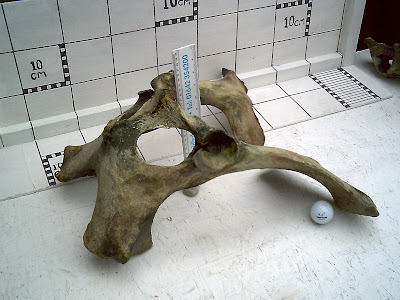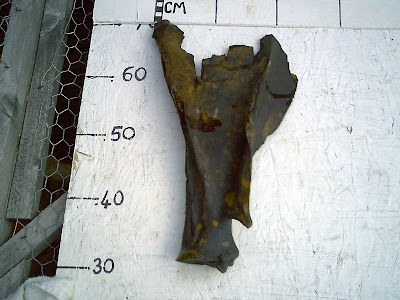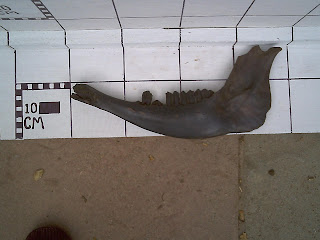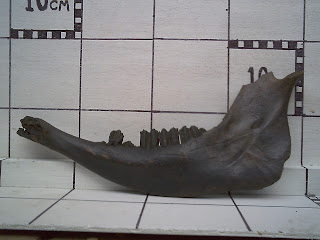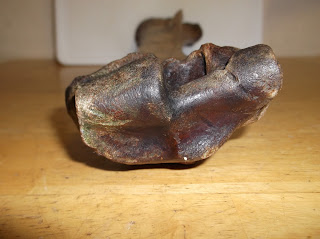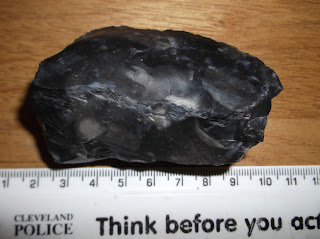Wednesday, 25 May 2011
Old records of early findes
Bovine lumbar vertebrae measuring 270mm wide 140mm high weighing 275 grams
Bovine atlas vertebrae measuring 180mm wide 100 mm high weighing 300 grams
Bovine intact pelvis measuring 540mm by 560mm weighing 3300 grams
Bovine jaw measuring 380mm long 220mm highest weighing 1750 grams
Bovine scapula measuring 430mm long 260mm wide with quite a bit missing weighing 800 grams
Bovine atlas vertebrae measuring 180mm wide 100 mm high weighing 300 grams
Bovine intact pelvis measuring 540mm by 560mm weighing 3300 grams
Bovine jaw measuring 380mm long 220mm highest weighing 1750 grams
Bovine scapula measuring 430mm long 260mm wide with quite a bit missing weighing 800 grams
Saturday, 14 May 2011
Ancient use of stone from the Cleveland dyke at Stainsby beck
I made an earlier post showing the Cleveland dyke at Stainsby beck in the south west Cleveland area, i now after further visits and research believe the stone was taken from this outcrop and used at least in the nearby area.
Ive found large amounts of the stone that seem to have been used as dams of some sort in at least four different locations, all upstream from the dyke exposure, I've found no historical reference to the dyke being utilized at this exposure point at Stainsby, so can only imagine it was a very long time ago.
I will be researching this area a lot more in the future as i believe it has a hidden and yet unknown history.
Ive found large amounts of the stone that seem to have been used as dams of some sort in at least four different locations, all upstream from the dyke exposure, I've found no historical reference to the dyke being utilized at this exposure point at Stainsby, so can only imagine it was a very long time ago.
I will be researching this area a lot more in the future as i believe it has a hidden and yet unknown history.
Location:Cleveland England
Middlesbrough, UK
Thursday, 5 May 2011
Comparisons
Hello all if anyone with an interest in my finds, or the geology i am finding them in has any information that they think may help, please post comment and i would be most happy to post any comparative images.
I hope that once properly identified the fossil bone on this site can be used as accurate reference for anybody needing it for there own research, as i know how hard it can be to get trusted comparisons and information.
I hope that once properly identified the fossil bone on this site can be used as accurate reference for anybody needing it for there own research, as i know how hard it can be to get trusted comparisons and information.
Thursday, 28 April 2011
Very large Bovine jaw
Hello all i found this large fossil bovine jaw yesterday. It measures 380 mm long with at least 60 mm missing, and 150 mm tall with about 60 mm missing from the top, weighing 750 grams dry.
I believe it to have been a young animal as its first and 4th teeth are not fully developed yet.
The only damage i can see i believe like most of my other bones was caused by Geological pressure while its been buried.
I believe it to have been a young animal as its first and 4th teeth are not fully developed yet.
The only damage i can see i believe like most of my other bones was caused by Geological pressure while its been buried.
Wednesday, 27 April 2011
More fossil bone
I found these yesterday like all the fossil bone i have been finding there heavily mineralised.
They include what i believe to be a very large bovine metacarpal measuring 230 mm, 9 inches long, 75 mm wide, weighing 525 grams.
Also a worked rib, and large ulna fragment.
I have no idea what this bone belonged to, but i think its a tibia.
This antler piece is very heavy weighing 375 grams.
The two large tibia probably belonged to deer or bovine, ime having difficulty seeing a specific difference when comparing large deer and bovine tibia.
Ive just noticed this old post and although it was created as best i could at the time, it is a poor example, most of these bone pieces are now in the possession of the local Junior school, and i have not yet had chance to re take better images, but i will leave this post open, and will post the new improved images and explanations.
They include what i believe to be a very large bovine metacarpal measuring 230 mm, 9 inches long, 75 mm wide, weighing 525 grams.
Also a worked rib, and large ulna fragment.
I have no idea what this bone belonged to, but i think its a tibia.
This antler piece is very heavy weighing 375 grams.
The two large tibia probably belonged to deer or bovine, ime having difficulty seeing a specific difference when comparing large deer and bovine tibia.
Ive just noticed this old post and although it was created as best i could at the time, it is a poor example, most of these bone pieces are now in the possession of the local Junior school, and i have not yet had chance to re take better images, but i will leave this post open, and will post the new improved images and explanations.
Monday, 18 April 2011
New images of fossils, and fossil bone, and mineral collection
Above large bos horn core and skull piece.
Above Horse Radius
Above a mineralised Bos skull
Above another mineralised Bos skull
Above large fragment of a Bos skull
Above a piece of a Mandible i believe has been carved
Above an unknown skull piece the Atlas vertebrae would be attached to this bone.
The three images above show an unknown Radius, possibly Cervidae.
Above an unknown Ulna piece
Above an unknown vertebrae
Above just some of the minerals and mineralised bones, ive excavated from a three metre square section of the Stainton gravel beds
Above Mica Schist in Quartz both smokey and rose.
Above carboniferous limestone slab containing trace fossils
Above Human Tibia excavated from my main excavation at Stainton, over two metres into the gravel beds.
The three images above show Jurassic limestone slabs containing, mainly very well preserved Gryphaea.
The three images above show an Ammonite segment that is formed by smaller fossils.
Above an unknown fossil shell in what looks to be Hemetite
The three images above show a mineralised horse tooth, i excavated a metre into the packed Stainton gravel beds at my main excavation at Maltby beck.
The two images above show an unknown Mandible piece excavated at the Maltby excavation
The two images above show a mineralised mandible section with blue teeth.
The six images above show a mineralised Human Femur found at Stainsby beck Thornaby on Tees.
The two images above show a mineralised Bos skull found at Stainsby beck Thornaby on tees.
The image above shows a piece of Tuff containing fossil Cadis fly larvae tubes, found in Mercia mudstone, at Stainsby beck Thornaby on tees.
The above image shows what i believe to be bone and stone tools, found just down stream from my main excavation at Stainton beck.
The above three images show a carved bone artefact, that has been viewed by professionals at York and Durham Universities, as well as at the National history museum, yet i still have no answers.
The above two images show what i believe to be digging sticks.
The above three images show an amazingly well preserve Canis skull found close to a previously shown Bos skull and Human Femur at Stainsby beck Thornaby on tees
Above Cadis fly larvae found in more Tuff from the Mercia mudstone at Stainsby beck Thornaby on tees
The above two images show a horse skull section found at Stainsby beck Thornaby on Tees
The above image shows me pointing out an impact on the Bos skull, also just before half way down the pencil the bone of the eye socket has been impacted probably at the same time but has fused.
The image above shows what i believe is a mineralised tine from a Cervus Elephus ( Red Deer )
The image above shows a very large mineralised antler piece found at the same location as the Human Radius finds at Stainsby beck Thornaby on Tees.
The images above show a very strange as yet unidentified mineral, note the perfect split, this was excavated from the same area of my main excavation of the Stainton gravel beds, at Stainton beck.
The above image shows a small piece of Graphite i also excavated from my main Stainton beck excavation.
The image above shows an unknown fossil rich rock excavated from the Stainton site.
The two images above show a Septerean nodule, excavated from my main excavation at Stainton beck, note the fossils.
The image above shows most of the mineralised bones fossils and minerals, ive excavated from the three square metre excavation of the Stainton gravel beds at Stainton beck.
Unknown.
The two images above show a heavily mineralised horse Femur, the Femur has had all the staining caused by its long time in the rotting organic material in the beck sediments removed.
The image above shows two Canis mandibles.
The above image shows a large Bovine Mandible
The two images above show a Bos or Cervidae pelvis piece.
The two images above show a worked bone handle.
The four images above show a Horse Radius, i have far more individual Horse bones than of any other animal and am yet to find one in poor condition, or to have any sign of attention by man or scavengers.
All of these items were either found lose in the deep beck valleys of the south west area of Cleveland North East England, or excavated by myself from the newly discovered Stainton gravel beds , and ancient lake bed deposits
All of these items were either found lose in the deep beck valleys of the south west area of Cleveland North East England, or excavated by myself from the newly discovered Stainton gravel beds , and ancient lake bed deposits in the same area.
50  49
49
 49
49
Subscribe to:
Comments (Atom)














